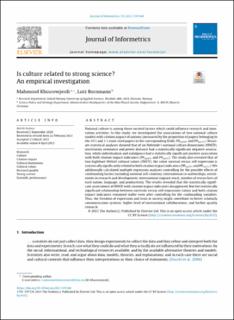Is culture related to strong science? An empirical investigation
Peer reviewed, Journal article
Published version
Permanent lenke
https://hdl.handle.net/11250/2983599Utgivelsesdato
2021Metadata
Vis full innførselSamlinger
Sammendrag
National culture is among those societal factors which could influence research and innovation activities. In this study, we investigated the associations of two national culture models with citation impact of nations (measured by the proportion of papers belonging to the 10 % and 1 % most cited papers in the corresponding fields, PPtop10% and PPtop 1%). Bivariate statistical analyses showed that of six Hofstede’s national culture dimensions (HNCD), uncertainty avoidance and power distance had a statistically significant negative association, while individualism and indulgence had a statistically significant positive association with both citation impact indicators (PPtop10% and PPtop1%). The study also revealed that of two Inglehart-Welzel cultural values (IWCV), the value survival versus self-expression is statistically significantly related to both citation impact indicators (PPtop10% and PPtop 1%). We additionally calculated multiple regression analyses controlling for the possible effects of confounding factors including national self-citations, international co-authorships, investments in research and development, international migrant stock, number of researchers of each nation, language, and productivity. The results revealed that the statistically significant associations of HNCD with citation impact indicators disappeared. But the statistically significant relationship between survivals versus self-expression values and both citation impact indicators remained stable even after controlling for the confounding variables. Thus, the freedom of expression and trust in society might contribute to better scholarly communication systems, higher level of international collaborations, and further quality research.

